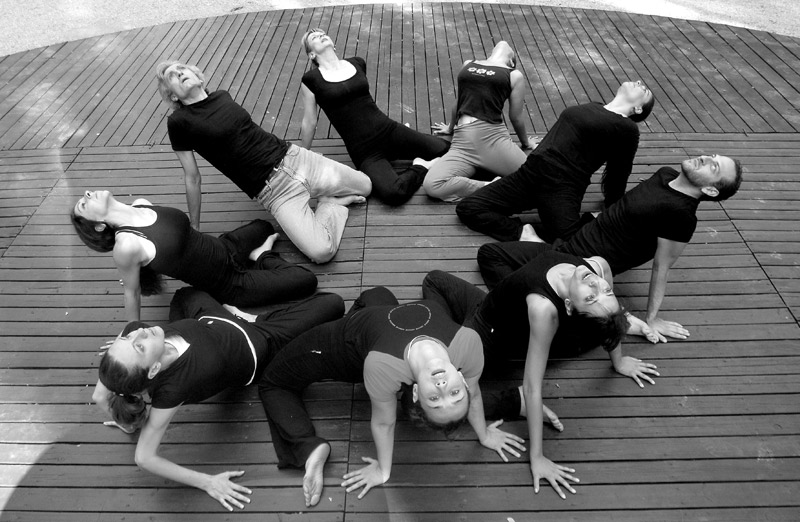Eleftherotypia - (Interview)
“The modern theatre wears many hats all at once”
By GIORGOS VIDALIS
17 years of theatre abroad (Canada and Great Britain mainly) Nikos Dionysios returns directing and choreographing the Aeschylean tragedy “Seven Against Thebes” with the Corfu Regional Repertory Theatre. The premiere is tonight at the theatre “Rena Vlahopoulou” in Mon - Repos and the main roles are performed by Kostas Laos (Eteokles), Spyros Kotsopoulos (Messenger), Ektoras Kaloudis (Preacher), Katerina Polychronopoulou (Antigone).
Nikos Mitrogiannopoulos (Dionysios is the name of his late father which he now uses) has achieved a successful career as an actor mainly with the Popular Experimental  Theatre of Leonidas Trivizas (Orestes in “Orestes” of Euripides, Eteocles in “Seven Against Thebes”, Alcibiades in “Timon of Athens” Shakespeare, Euripides in “Women of Thesmophoria” Aristophanes etc.) His last work in Greece was “Ephemera” under his direction – an original performance based on birth, love and death in combination with the poetry of Nikos Eggonopoulos (with the same title he presented this play with the poetry of Margaret Atwood in Toronto and in London with the poetry of Harold Pinter).
Theatre of Leonidas Trivizas (Orestes in “Orestes” of Euripides, Eteocles in “Seven Against Thebes”, Alcibiades in “Timon of Athens” Shakespeare, Euripides in “Women of Thesmophoria” Aristophanes etc.) His last work in Greece was “Ephemera” under his direction – an original performance based on birth, love and death in combination with the poetry of Nikos Eggonopoulos (with the same title he presented this play with the poetry of Margaret Atwood in Toronto and in London with the poetry of Harold Pinter).
- What raises Aeschylus in this tragedy?
“As we know, Greek tragedians used myth in order to make parallelisms with Athenian society and their reflections and current political situations of the time. Aeschylus unleashes the curse of Oedipus and via this he affronts the "authority" and any of its extensions and effects. A “curse” that does not have a way out, or ending since it is continued via Antigone and the divided population. An archetypal report of “divide and conquer”, that the modern world knows very well”.
- How much does it concern us today?
“Seven against Thebes" is diachronic and modern. It negotiates the war, the fear, the exclusion, the absolute and impersonalization of power, the new political institutions, and the tragedy of it being bestowed upon women and children, the receptors and victims of a situation that doesn’t concern them. All these subjects that are raised through this particular tragedy are questions that have troubled ancient and modern societies”.
- What perspective is your directorial view trying to project?
“I began with the fact that I'm directing a play with action and not simply poetic text.
![Nikos Dionysios [b]Nikos Dionysios[/b], that is to say Nikos Mitrogiannopoulos of the Popular Experimental Theatre of L. Trivizas](/images/reviews/7against_nd.jpg) I created a Dance which also has a kinesiological reaction based in modern forms, maintaining however an archetypal base. Also, in the part of the play where it is disputed if it was written by Aeschylus, I included elements of opera and for the role of Antigone I also activated the element of "spectator". As for the speech we worked so as to make it cleaner through the poetry and the rhythms that the text imposes”.
I created a Dance which also has a kinesiological reaction based in modern forms, maintaining however an archetypal base. Also, in the part of the play where it is disputed if it was written by Aeschylus, I included elements of opera and for the role of Antigone I also activated the element of "spectator". As for the speech we worked so as to make it cleaner through the poetry and the rhythms that the text imposes”.
- Acting, direction, choreography. Your three attributes that you combine in your performances abroad. How did this work? Where do you give priority?
“This combination resulted from personal need. I believe that in modern theatre we should wear many hats, sometimes all together in order to find new ways of communicating with the public and with ourselves. I don't give any priority. I believe that theatre regenerates itself through the delicate balances of all its elements”.
- What interests you more in your theatrical exploration?
“The illusion or dream, it's aesthetics, honesty and the existence of poetry in the theatre. The theatre that I create is based just as much on research as it is on experimentation. I emphasize on these two factors, since both of them, in combination with the internal travel of the creator, are essential roads taken in order to arrive at a conclusion and scenic act”.
- Why did it take you so long to present your own work in Greece?
“The conditions weren't right for doing so. But it's never too late”.
- Are you preparing something for the winter?
“I'm preparing a new play based on Shakespeare, an experimental approach on tragedy for the spring of 2008 and there is a good possibility I may perform “Ephemera” again with the poetry of Harold Pinter”.
** The tragedy “Seven Against Thebes” is being presented in translation by K.X. Myri, set-costumes Nikos Kokkalis, music Andreas Kalogeras. Dance constitute: Ermina Gerardi, Nota Darmani, Katerina Milioti, Corina Vassilopoulou, Dionyssis Stravoravdis, Sofianna Kanta, Natasa Favianou, Dora Pandi.
ELEFTHEROTYPIA - 08/08/2007
Copyright © 2007 X. K. Tegopoulos
